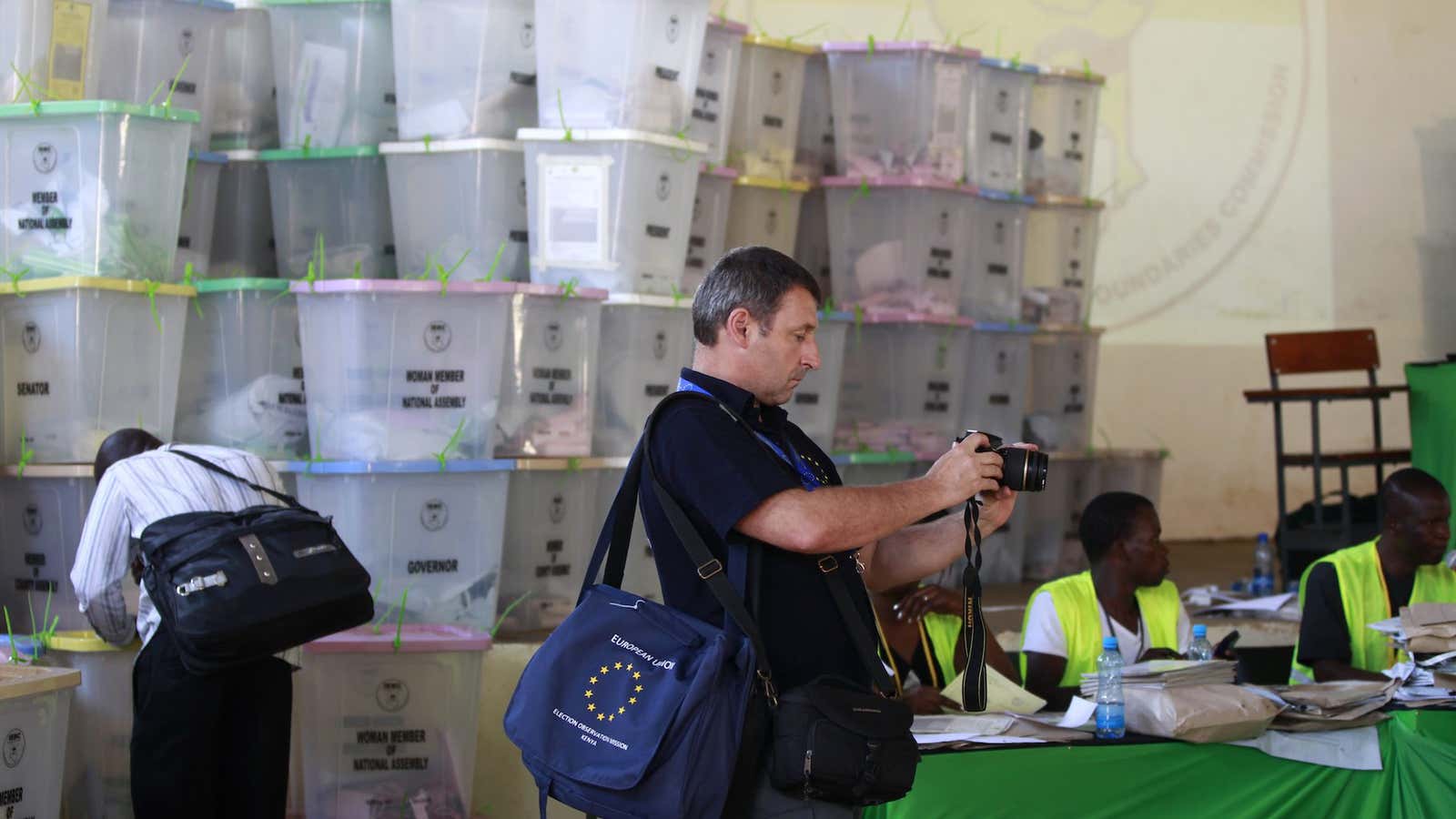When Kenya returns to the polls to decide its next president, the hundreds of election observers who attended last month’s vote might not be welcome.
Election monitors are tasked with assessing the conduct of an election process as an independent party. Observers of this kind, from the African Union, the European Union, the Commonwealth Nations, and the United States-based Carter Center endorsed the results of Kenya’s Aug. 8 election. Former US secretary of state John Kerry, head of the Carter Center’s mission, applauded the process as “free, fair and credible” despite “little aberrations here and there.”
Less than a month later, those aberrations, which include 5 million unverified ballots, led Kenya’s high court to annul the election, overturning the victory of incumbent president Uhuru Kenyatta. The president should face his rival, opposition candidate, Raila Odinga again on Oct. 17, a date set by the electoral commission.
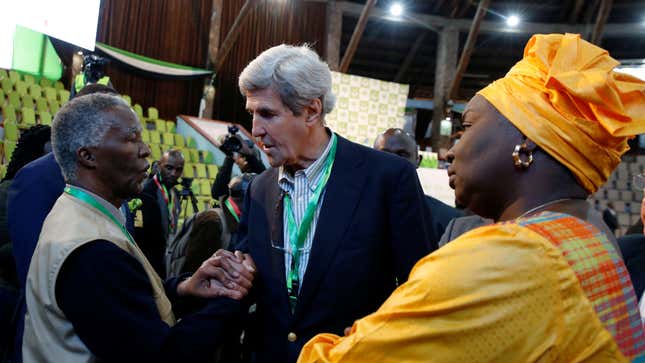
Criticism has quickly turned onto the role of election observers. Odinga, who petitioned the court to invalidate the vote, released a statement saying, “With this courageous verdict we put on trial the international observers who moved fast to sanitize fraud.”
When Kerry tweeted a response from the Carter Center on the court ruling, Kenyans flooded him with insults. “Please don’t come back to Kenya,” one wrote. “Come again, but this time go straight to the Masai Mara and back to the embassy,” another said, referring to Kenya’s national park, popular for safaris.
Since the 1990s, as much as 85% of elections in young democracies like Kenya, which introduced multiparty democracy around then, have been observed by monitoring missions. (European countries sent the first observer missions in 1857 for referendums that resulted in the formation of Romania.)
The results have been mixed. From Mexico to South Korea, observers have pushed needed electoral reforms, offered mediation during highly contested elections, and acted as a deterrence for fraud. Still, manipulation continues. Judith Kelley, a professor at Duke University who analyzed more than 600 monitoring missions for a 2012 book on the subject, found that when monitors were present, politicians still attempted to rig votes 17% of the time.
In Kenya, election observers praised an election that critics say was a clearly compromised vote. Days before the August poll, a top election official in charge of the security of the country’s new $24 million electronic voting system was found dead outside of Nairobi, tortured and strangled. On election day, the system, which was meant to transmit the results to Nairobi, broke down. Totals from many voting stations were sent by text message instead.
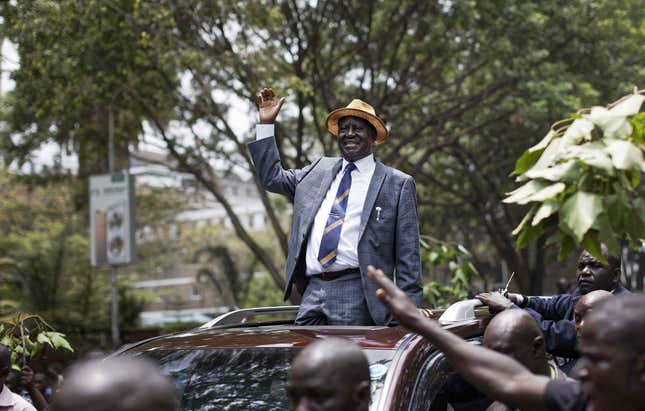
Many of those that were sent, which are forms known as 34As, showed irregularities. They lacked official stamps or serial numbers, were signed by the same person, or came from non-existent polling stations, according to Odinga’s court petition. Unauthorized users also gained access to the electoral system before and after the election, according to the petition, which the high court upheld.
In their defense, observers have said they only endorsed the voting process, not the election as a whole, congratulating Kenya for a peaceful and orderly election day. The heads of the observer missions said in a joint statement the day after the vote, “It is important to remind all stakeholders that the electoral process is still ongoing.” They called on Kenya’s electoral commission to continue the tallying with “full integrity and transparency so that all Kenyans can trust the announced results.”
For many Kenyans, especially those who support Odinga, this is still problematic. Observer statements were cited by Kenyatta’s Jubilee party as proof of a clean election. Meanwhile, Odinga was pressured to concede for the sake of stability. “Observers have been cleansing electoral malpractices in Kenya and Africa by basing research on the voting day, yet [an] election is a process,” says Dennis Owino, a governance analyst in Nairobi.
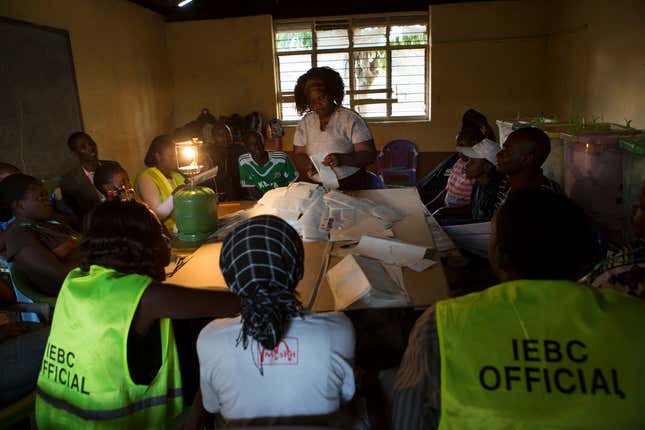
A consistent criticism of election observers is that they focus too much on the day of the election, looking out for things like voter intimidation or ballot box stuffing, a method most monitors say is outdated. During the vote in Kenya, observers did not see how the results were transmitted, accepting the electoral commission’s promise that the results would be verified.
It’s an example, according to Calestous Juma, a professor of science and technology at Harvard University, of how democratic practices haven’t caught up with technology. “It is ironic that it is in Africa that technology is tripping Western election observers. Just like elections have gone digital so must observation be modernized to adapt to modern times,” Juma says.
Yet, questions about the role of observer missions go beyond Kenya’s recent use of electronic voting systems. International monitors also endorsed Kenya’s 1997 and 2013 presidential elections, even though the opposition raised issues about the integrity of both elections. In Rwanda, human rights researchers found cases of voter intimidation and repression of opposition candidates during its August election, which Paul Kagame won easily. In a statement, European observers said the poll was a “step to strengthen the electoral process.”
In Uganda, where president Yoweri Museveni was re-elected last year amid a social media blackout, violence, and contradictory vote counts, the EU mission neither endorsed nor condemned the election. Instead it urged the public to read its report and “draw their own conclusions.”
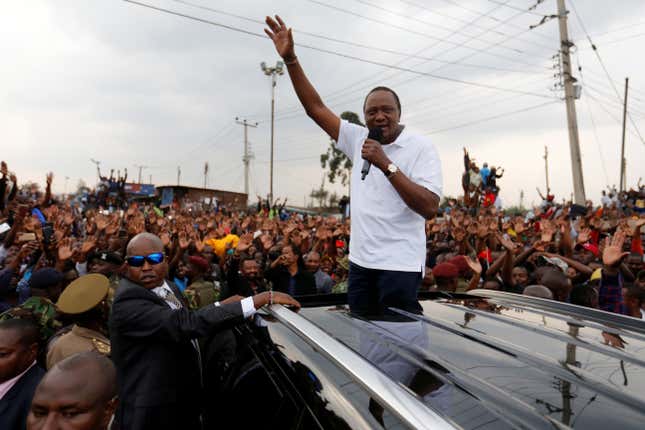
“For several years, election observers’ main audience has been the international community, rather than the population whose election they are monitoring,” says Emma Gordon, senior East Africa risk analyst at the UK-based consultancy Maplecroft. “Across the continent, there are examples of observers describing elections as broadly free and fair, when there is a perception domestically that rigging occurred.”
There are other factors at play. According to Kelley, monitors are more likely to endorse elections of countries that are major foreign aid recipients. Kenya, one of the US’s closest allies on the continent, received more than $500 million in United States Agency for International Development (USAID) funding last year.
More importantly, Kenya’s annulled election underscores the fact that election observing is imperfect. Observer missions are usually made up of small teams, constrained by logistics and time. “Expectations of observers have always been unrealistically high,” says Kelley.
Short-term observers in Kenya did, in fact, monitor the entire August poll, from the opening and closing of poll stations, to the voting, counting, and tallying. By that point, many observers had been working for more than 30 hours. One observer told Quartz. ”I’m not saying I saw fraud. I didn’t. I just saw confusion and very tired staff.”
